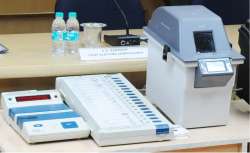All we need to know about ‘voter verifiable paper audit trail’ and its introduction
The idea of an additional layer of transparency for the satisfaction of voters in the form of a ‘voter verifiable paper trail’ was suggested by the political parties in a meeting taken by the Election Commission of India on 4th October, 2010

VVPAT or Voter Verifiable Paper Audit Trail device functions like a printer to be attached to the ballot unit and kept inside the voting compartment. When the voter presses the button against the name of the candidate of his choice on the Ballot Unit, the VVPAT unit generates a paper slip, called Ballot Slip.
This paper slip contains the name, serial number and symbol of the chosen candidate. The voter can see this slip through a screened window where it stays for seven seconds, and then it automatically gets cut and falls into a sealed drop box.
In this process, the slip will not go into the hands of the voter nor will others be able to see it.
VVPAT was first suggested by political parties in 2010
The idea of an additional layer of transparency for the satisfaction of voters in the form of a ‘voter verifiable paper trail’ was suggested by the political parties in a meeting taken by the Election Commission of India on 4th October, 2010.
Accordingly, introduction of the VVPAT was facilitated by amending the Conduct of Election Rules, 1961 vide Notification dated 14th August, 2013.
Thereafter, 20,300 VVPAT Units were purchased by the ECI in 2013.
Since then, these units are being deployed in elections in select Assembly and Parliamentary Constituencies. Subsequently, order for 67,000 additional Units was placed in 2015, out of which 33,500 Units have been supplied by the manufacturers. Requisite funds for purchase of the aforesaid number of VVPAT Units were provided by the Government as and when requested by the Election Commission.
Subramanian Swamy’s civil appeal for use of VVPAT
It is worth a mention that a civil appeal was filed by BJP MP Dr. Subramanian Swamy pleading for directions to the Election Commission to use VVPAT Units in all polling booths.
It was alleged in the said Petition, that the Electronic Voting Machines are not reliable and that there should be some device by which the voter should get a confirmation that the vote cast by him has been recorded in favour of the candidate of his choice.
In deference to the plea of the petitioner in the aforesaid appeal, the Election Commission submitted that it has no objection to the introduction of VVPAT Units for conduct of free, fair and transparent elections. The Supreme Court in its Order dated 8th October, 2013 directed that for implementation of such a system of VVPAT in phased manner Government of India may provide required financial assistance for procurement of requisite number of VVPAT Units.